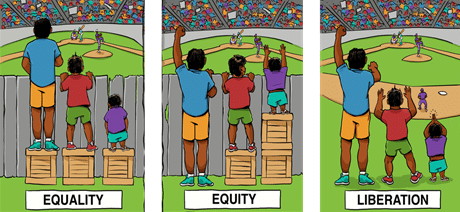Justice, Equity, and Ordination
Program Minister of the Open and Affirming Coalition
“Justice,” in a biblical sense, means to “make right.” Advocating for justice was an important part of the prophets’ work and of Jesus’s ministry. Recognizing the growing need to train for justice ministries, many seminaries now offer programs highlighting racial, environmental, and LGBTQIA+ justice as vocations in service to the entire world as a parish. This is all holy and sacred ministry.
Yet once out of seminary, many ministerial candidates in justice-minded denominations experience ordination processes that often do not treat them justly, largely because of two factors.
First, many mainline Protestant denominations still primarily recognize ordained ministry as a call to pastor a single parish. Those called to the ministry of justice beyond parish walls often end up in a liminal space in the ordination process if their authorizing bodies do not recognize non-parish ministries. Those called to the ministry of justice within parish walls may also struggle to find support in the committees that determine their ordination, even as they lead their faith community in speaking as advocates on justice issues.
Second, personal and societal biases impact the assessment of ministerial candidacy. In alignment with employment challenges outside of churches, LGBTQIA+ candidates and clergy – especially those who are gender-expansive – have a harder time finding a church job in comparison to heterosexual cisgender candidates and clergy. In the United Church of Christ, 32% of our churches are Open and Affirming; for LGBTQIA+ candidates who seek to serve in an Open and Affirming congregation, the potential field for ordainable employment is reduced by as much as 70% before they even start looking. Changing the biases that ease the path to ordination for young, white, cis-het, male candidates – but limit and discourage LGBTQIA+, non-white, or disabled candidates from ordination into parish and non-parish ministries – is a matter of justice.
While it has been assumed that equality of access to ordaining bodies (such as Committees on Ministry) leads to equality of treatment for ministry candidates, a standard committee meeting does not come with a guarantee that every candidate will be treated the same by the committee. Equality of access does not guarantee that issues of bias – against an individual candidate’s identity or a type of ministry – are being actively addressed by the committee. Our goal should not be equality of access but equity of experience, and equity is an important step toward the liberation that will come with the removal of systemic barriers.
Justice work is holy work. As we consider what justice looks like, treatment of rising ministers – especially those called to non-parish justice ministry and/or those who are part of historically underrepresented groups – must be analyzed. We must create space for those who follow our still-speaking God into ordained ministry, for whom bias against employment become a barrier to serving God as a minister of word and sacrament. It might be that new possibilities for our ordination systems should be explored as part of our commitment to a just world.
Kimi Floyd Reisch is the Program Minister of the Open and Affirming Coalition for the United Church of Christ.
View this and other columns on the UCC’s Witness for Justice page.
Donate to support Witness for Justice.
Click here to download the bulletin insert.
Related News
Celebrating Diversity, Equity, Inclusion, and Accessibility
In the beautiful diversity of humankind, we are invited to celebrate diversity, equity,...
Read MoreThe Gifts of Advent
One of my favorite seasons of the year is Advent, which often falls on the first Sunday after...
Read MoreLand, Artifacts, and Ancestors Back
Imagine one of your great grandparents toiled over a hand-written, illustrated copy of the...
Read More
